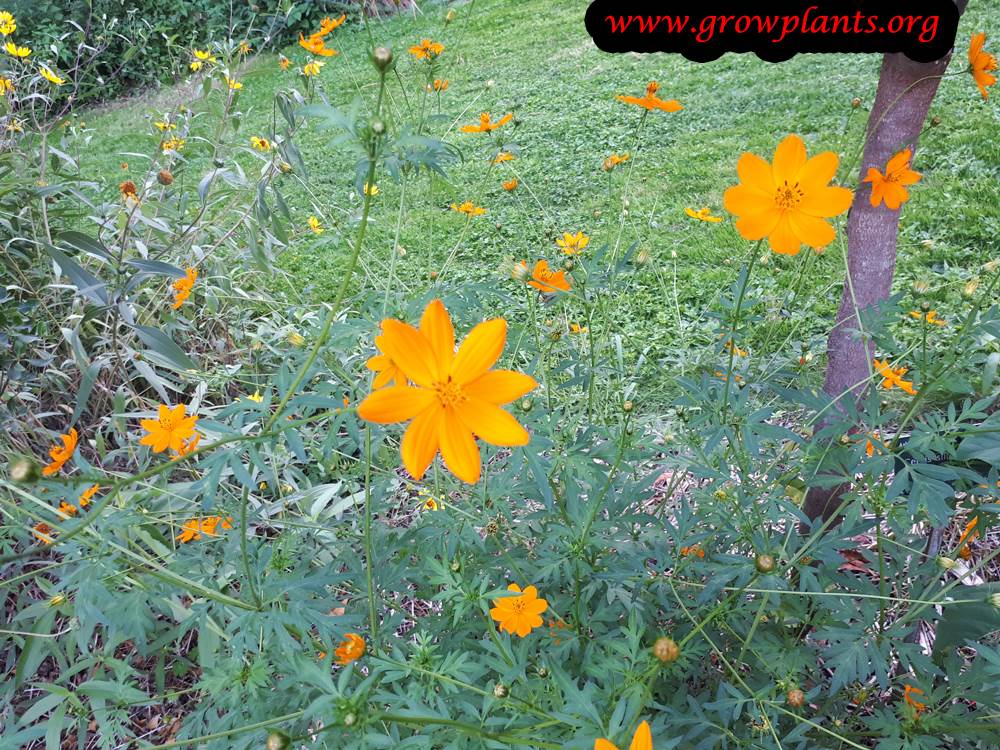
Cosmos sulphureus growing herbaceous of the genus Cosmos also known as Sulfur cosmos, Cosmos sulphureus perennial evergreen or annual plant, used as ornamental plant and cut flower and attract pollinators and also drought tolerant, can grow in tropic, mediterranean, desert, subtropical or temperate climate and growing in hardiness zone 10b+ as perennial and 4+ as annual.
Leaves color green in pinnate structure.
Cosmos sulphureus flower
Flower color yellow, orange, purple in daisy shape.
Cosmos sulphureus for sale – Seeds or Plants to Buy
How to grow Cosmos sulphureus growing and care:
Well-drained soil, frost free, mulch
How to care:
Care usually require, fertilize in the spring add humus and organic matter, prune once a year for perennial
What is the best way to start growing?
Plant / Seed (explanation bellow) / Vegetative reproduction (when start from cutting better in the spring before the plant start bloom and even better when start to grow in stems that tend to grow (where there are buds)
Is it necessary to use vegetative reproduction?
No
Difficulties or problems when growing:
Invasive
Planting season:
Spring as annual (better after last frost), spring to summer in hardiness zone
Pests and diseases:
Slugs, aphids, mealy bugs
Pruning season:
Winter
How to prune:
Just to design
Size of the plant:
30-150cm, 12-60 inches
Growth speed in optimal condition:
Fast growing / Medium growing
Water requirement:
Small amount of water / Average amount of water
Light conditions in optimal condition for growing:
Full sun / Half shade
Is it possible to grow as houseplant?
No
Growing is also possible in a planter /flowerpot / containers:
Yes, when grow in container, size 5-15 liter (1.5-4 gallon) depend the cultivar, average amount of water that needed, it’s to keep the soil moist and the water go out of the pot, better not to use bottom for the pot, when it’s grow as perennial every two years to switch soil, and prune part of the roots and the plants, soil need to be well ventilated with good drainage, rich with organic matter, can us in potting mix or peat soil with perlite or vermiculite.
Blooming information
Bloom season?
Spring / Summer / Autumn
General information about the flower:
Yellow, orange or purple flowers in daisy shape
How to grow Cosmos sulphureus from seeds
Sowing requirement:
Temperature 20C-26C (68-80) better 25C
Saving seeds and care until sowing:
Dry and dark place in room temperature
Sowing season:
Spring after last frost to summer in hardiness zone 4-10a (better to sow it indoor in the end of the winter), spring to autumn to in hardiness zone 10b-11a, all year in hardiness zone 11b+
How to plant:
Plant in rich soil or other kind of soil that keep high moist
Planting spacing:
15*20cm (6*8 inches)
Depth of Sowing:
0.5-1cm, 0.25-0.5 inches
Conditions for seeds germinate:
Moist soil, full sun
Watering requires for Seeds:
Average amount of water / Big amount of water
Germination time:
1-3 weeks
Condition of seedling:
Moist soil, full sun, better above 20C (68F)
Scientific name:
Cosmos sulphureus
Categories
| Blooming Seasons |
|
|---|---|
| Flower colors |
|
| Climate |
|
| Ornamental parts |
|
| Plant growing speed |
|
| Plant life-form |
|
| Plant Uses |
|
| Planting Season |
|
| Plants sun exposure |
|
| Watering plants |
|
| Hardiness zone |
|



